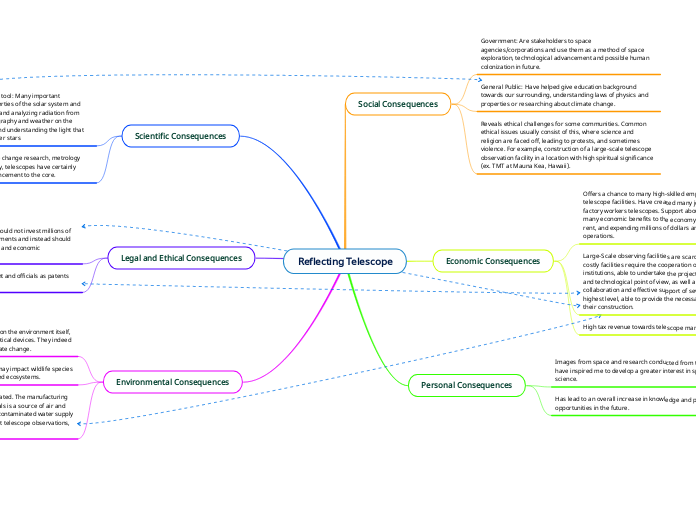Reflecting Telescope
Social Consequences
Government: Are stakeholders to space agencies/corporations and use them as a method of space exploration, technological advancement and possible human colonization in future.
General Public: Have helped give education background towards our surrounding, understanding laws of physics and properties or researching about climate change.
Reveals ethical challenges for some communities. Common ethical issues usually consist of this, where science and religion are faced off, leading to protests, and sometimes violence. For example, construction of a large-scale telescope observation facility in a location with high spiritual significance (ex. TMT at Mauna Kea, Hawaii).
Economic Consequences
Offers a chance to many high-skilled employment jobs in telescope facilities. Have created many job opportunities for factory workers telescopes. Support about 1,000 jobs and many economic benefits to the economy, such as annual lease rent, and expending millions of dollars annually in observatory operations.
Large-Scale observing facilities are scarce and costly. These costly facilities require the cooperation of highly qualified institutions, able to undertake the project from the scientific and technological point of view, as well as the vital collaboration and effective support of several countries, at the highest level, able to provide the necessary investment for their construction.
High tax revenue towards telescope manufacturing.
Personal Consequences
Images from space and research conducted from telescopes have inspired me to develop a greater interest in space science.
Has lead to an overall increase in knowledge and possible job opportunities in the future.
Scientific Consequences
Astronomer's most important tool: Many important discoveries made about properties of the solar system and universe. Means of collecting and analyzing radiation from celestial objects. As well, geography and weather on the planets in our solar system, and understanding the light that radiates from the sun and other stars
With advancements in climate change research, metrology and physics of light and gravity, telescopes have certainly made the discovery and advancement to the core.
Legal and Ethical Consequences
Arguments that the government should not invest millions of dollars into telescope and advancements and instead should those funds in humanitarian issues and economic development.
Legal conflicts between government and officials as patents between lands and technology.
Environmental Consequences
There is no potential negative effect on the environment itself, as no pollution is released in such optical devices. They indeed themselves helped research on climate change.
Consequences on the environment may impact wildlife species (endangered species) and imbalanced ecosystems.
A lot of power may need to be generated. The manufacturing of telescopes and the mining of metals is a source of air and water pollution. Hazardous spills or contaminated water supply is also a problem that can be faced at telescope observations, in a rare sense.
